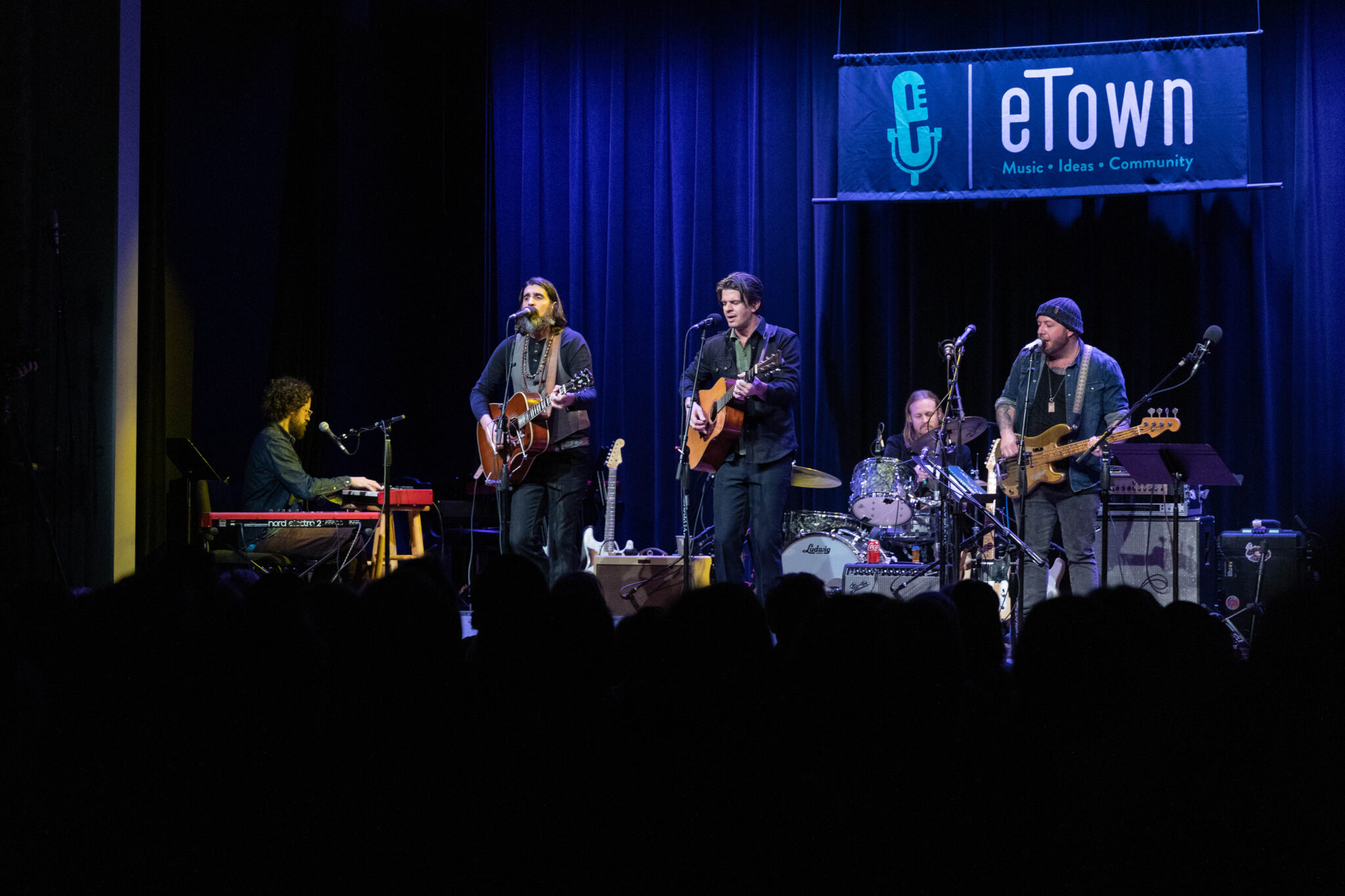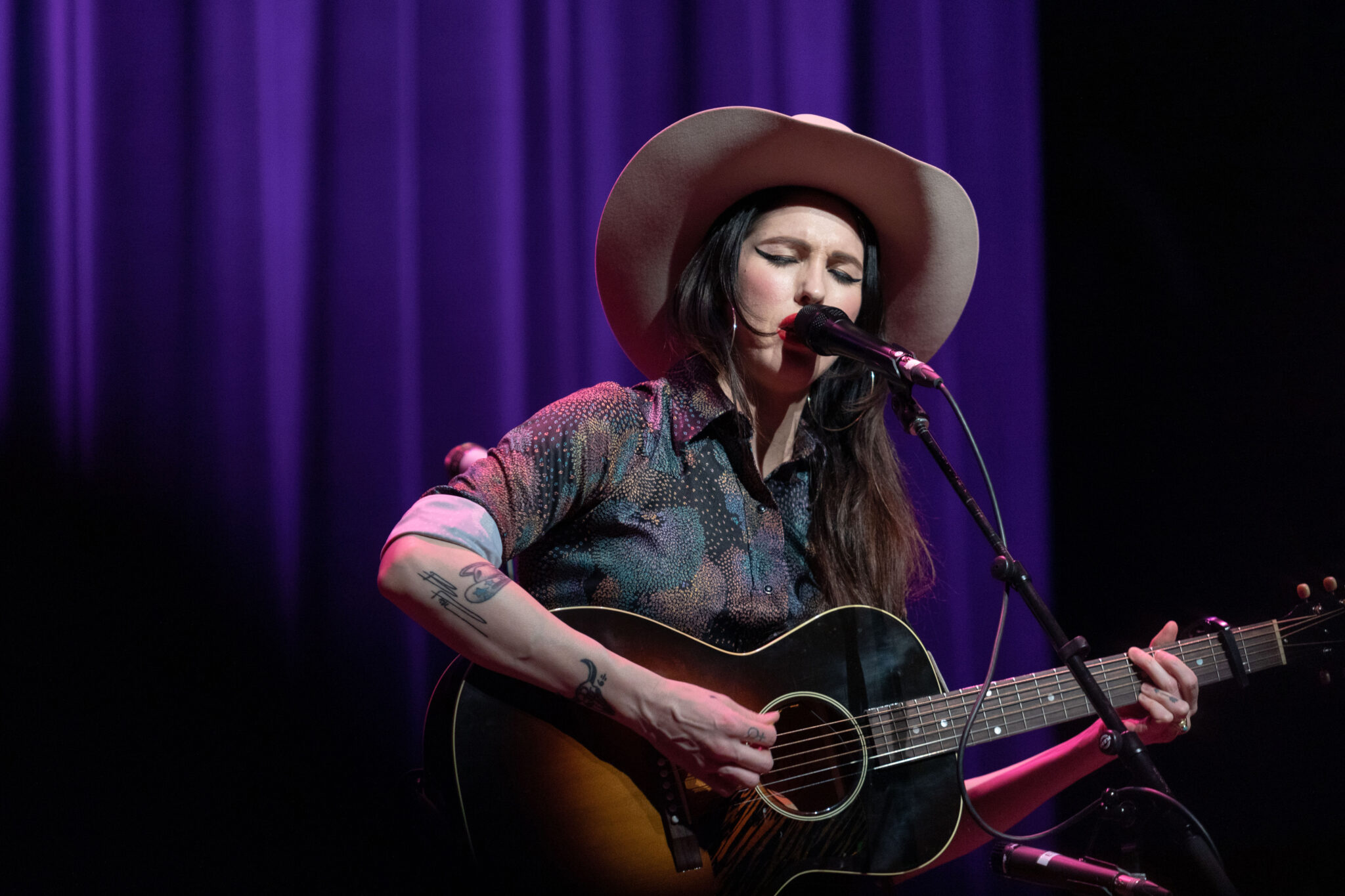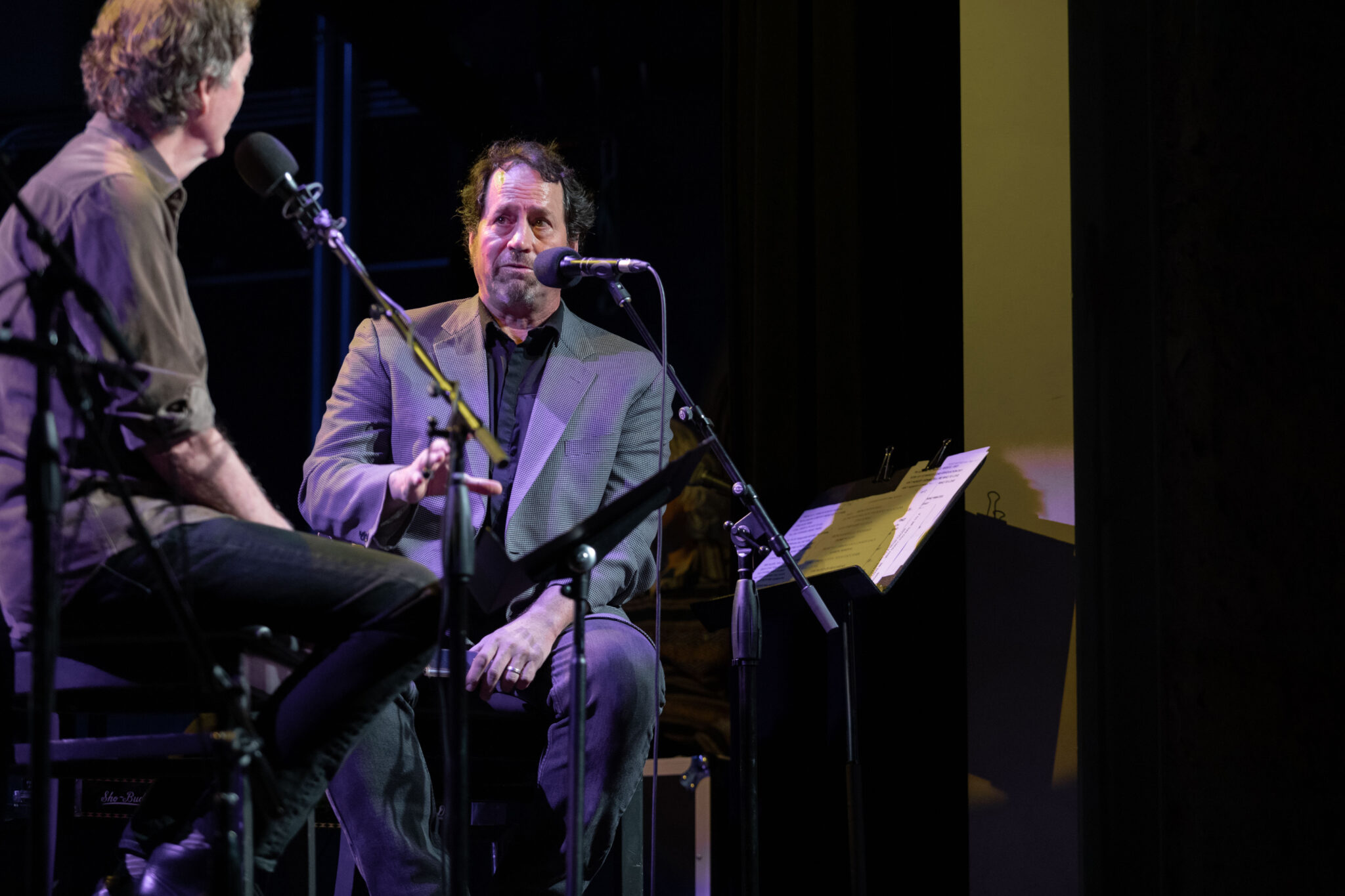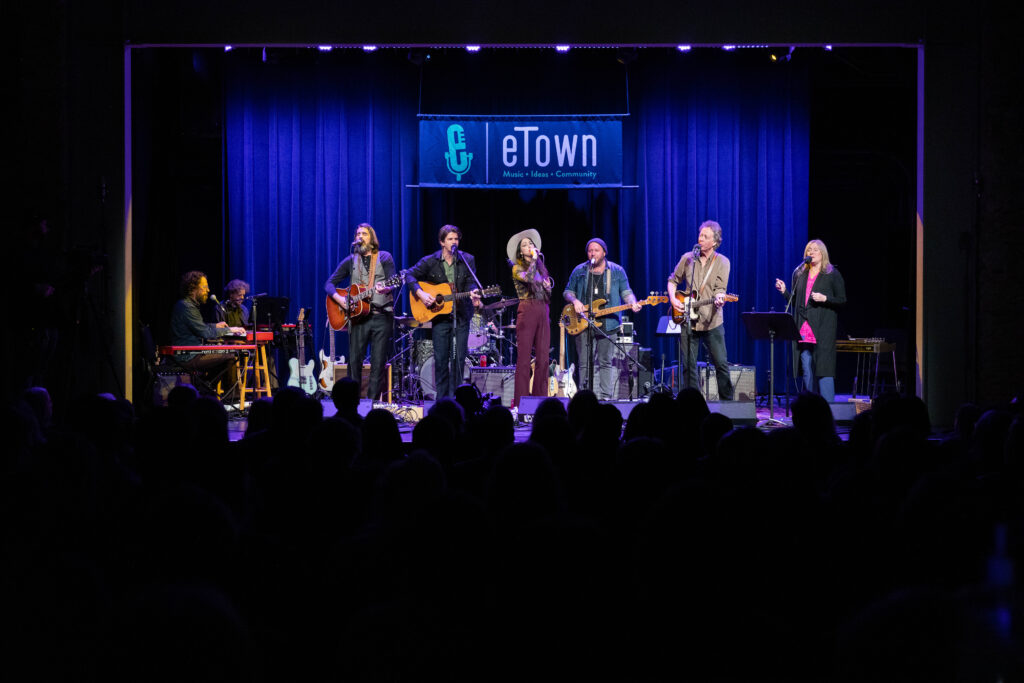This week, we head home to eTown Hall and welcome back The Band Of Heathens from Austin, Texas. Making her first visit to the eTown stage is outlaw Country phenom Jaime Wyatt from Nashville, Tennessee. Nick also has a sit down with Aaron Miripol, President and CEO of the Urban Land Conservancy to discuss the benefits of neighborhood preservation.
The Band of Heathens

Austin, Texas roots rockers the Band of Heathens play music that filters contemporary singer/songwriter and alt-country flavors through the guiding influence of dusty 1970s soft rock. Founded by three songwriters, the group specialize in tales with a distinct Southern flavor and characters with a taste for misadventure, buoyed by tasteful arrangements and harmonies. 2008’s The Band of Heathens was their first studio album after a pair of live discs, 2013’s Sunday Morning Record saw them reworking their sound after some major personnel shakeups, 2020’s Stranger was a thoughtful LP reflecting a time of American upheaval, and 2023’s Simple Things was dominated by songs of resilience in the face of life’s challenges.
Formed in Austin, the Band of Heathens became a group totally by accident. Songwriters Colin Brooks, Gordy Quist, and Ed Jurdi were all doing regular sets at Momo’s in Austin when they began sitting in with each other, eventually making the whole thing one big show that they called the Good Time Supper Club, which was essentially three singer/songwriters in the round backed by a solid rhythm section of John Chipman on drums and Seth Whitney on bass. What started out as a spontaneous side project soon became a full-fledged rock & roll band. The Band of Heathens’ first two albums were both live affairs, 2006’s Live from Momo’s and 2007’s Live at Antones (which was also released on DVD), while their third, simply called The Band of Heathens, was produced by Ray Wylie Hubbard and released in 2008 on BOH Records. A year later, the group released their second album, One Foot in the Ether, which again gained strong notices in Americana circles.
A third album, Top Hat Crown & the Clapmaster’s Son, appeared in 2011, and then the group saw some lineup changes. Vocalist/guitarist Colin Brooks left the band in 2011 and, not long afterward, so did the rhythm section of bassist Seth Whitney and drummer John Chipman, giving co-leaders Ed Jurdi and Gordy Quist the opportunity to redefine the group on their 2013 album Sunday Morning Record. They added drummer Richard Millsap, bassist Scott Davis, and keyboardist Trevor Nealon, and this lineup recorded Duende, which appeared in January 2017.
For their next album, the band turned to an unexpected source; 2018’s Message from the People Revisited found the Band of Heathens covering all ten selections from Ray Charles’ 1972 album Message from the People, which featured the soul icon performing songs reflecting the issues of the day. The album was the group’s first after bassist Scott Davis left the lineup and Jesse Wilson came aboard to take his place. The group traveled to Portland, Oregon, to work with producer Tucker Martine for 2020’s Stranger, a set of songs offering both solace and commentary as America struggled through a difficult year. That same year, the group made a guest appearance on Margo Price’s album That’s How Rumors Get Started, and they were one of the many acts who teamed up with Ray Wylie Hubbard on his 2022 release Co-Starring Too. They lended a hand to Raul Malo for his 2022’s album Quarantunes, Vol. 1, a collection of songs the Mavericks’ vocalist recorded virtually during the COVID-19 pandemic, and that same year, the band released Remote Transmissions, Vol. 1, a collection of covers with guest vocalists sitting in on each track – Butch Walker on Bob Seger’s “Night Moves,” Robert Ellis on Tom Petty’s “Walls,” Todd Snider on Guy Clark’s “L.A. Freeway,” and Margo Price on Lucinda Williams’ “Joy,” among others. Simple Things, issued on Boh Records in March 2023, was Band of Heathens’ first set of original material in three years, and the album was rooted in songs that celebrated perseverance and life’s small victories in the face of long odds. The release was followed by an extensive U.S. tour.
Jaime Wyatt

Hailed by Pitchfork as one of the “most exciting and skillful storytellers” working today, Jaime Wyatt is the kind of generational talent whose raw, honest lyricism is matched only by the power of her huge, unmistakable voice. Wyatt first began turning heads with her breakout 2017 debut, Felony Blues, which chronicled her now much-publicized battle with addiction and transformative journey through the criminal justice system. Wyatt’s 2020 follow-up, Neon Cross, tackled even more profoundly personal revelations. Both records arrived to universal acclaim, with NPR praising Wyatt’s “remarkable voice” and Rolling Stone lauding her “lush, layered, and complex” performances.
Her upcoming album, Feel Good Recorded with Black Pumas’ Adrian Quesada, takes Wyatt to new heights. Feel Good is bold and ecstatic, built on tight, intoxicating grooves that belie the songs’ substantial emotional stakes. Wyatt’s writing is unguarded and intuitive here, tapping into the deep recesses of her subconscious as she reckons with grief and growth, and her delivery is visceral to match, cutting straight to the bone with equal parts sensitivity and swagger. Taken as a whole, the collection stands as a radical act of creative liberation from an artist already known for pushing limits, a genre-defying work of healing and self-love that tips its cap to everything from Al Green and Otis Redding to Waylon Jennings and Bobbie Gentry in its relentless pursuit of peace and pleasure.
“I wanted to make music you could move to,” Wyatt explains, “but I still wanted it to have heart and integrity.”
Eschewing the traditionally solitary process that begot her early work, Wyatt penned Feel Good in a series of collaborative, freewheeling writing sessions built around infectious drum and bass grooves. Working with different rhythm sections in LA (her former hometown) and Nashville (her current hometown), Wyatt began experimenting with stream-of-consciousness and improvisation on the songs, allowing herself to trust her instincts (as well as those of close collaborator Joshy Soul) as she pulled lyrics and melodies from the ether.
“I really tried to listen to my gut and be in the moment with these songs,” Wyatt explains. “I figured out how to stop overthinking and second-guessing myself, everything started opening up in a really exciting way.”
Wyatt carried that same energy into Electric Deluxe Recorders in Austin, where she and the band cut much of the basic tracks and vocals live to tape before fleshing them out with lush horns, strings, and harmonies.
That natural chemistry is plain to hear on Feel Good, which opens with the driving “World Worth Keeping.” Written in a fit of inspiration Wyatt herself didn’t even understand at the time, the track is a fierce, soulful meditation on the kind of beauty that’s worth fighting for, no matter how hopeless things may seem. “Take a look around you / There’s a world worth keeping,” Wyatt proclaims over a shimmering organ and tremolo guitar. Like much of the album, the track is rooted in a defiant optimism, in a refusal to surrender to cynicism and negativity despite its ever-looming presence. The radiant “Back To The Country” finds Heaven in the simplest places, while the buoyant “Love Is A Place” revels in the freedom of being seen for who you truly are, and the effervescent title track embraces pleasure as a primal necessity. “All I want to do / Just to feel good, is just to feel right,” Wyatt sings, backed by towering gospel vocals.
“I spent a lot of my life feeling like it was selfish to want to feel good, that women were supposed to be meek and quiet and submissive,” she reflects. “I wasn’t born like that, though, and these songs were a big part of learning not just to accept myself, but to love myself, because if you can’t love yourself, then nobody can.”
It’s a lesson Wyatt’s learned the hard way over the years, and the specters of loneliness, loss, and heartbreak haunt the album throughout. The bittersweet “Hold Me One More Time” struggles with an inevitable parting of ways as it builds into a frenzied, cathartic roar; the sensual “Jukebox Holiday” longs for a love that seems to hang perpetually just out of reach; and the stripped-down “Moonlighter” drifts through the world in the dark of night, always on the outside looking in. Even when she’s tackling loss on a more existential scale—the ghostly “Where The Damned,” for instance, draws on the stories of missing indigenous women in a solemn remembrance of the forgotten, while the rousing “Fugitive” examines the aftermath of gun violence—Wyatt still manages to find something to believe in.
“A lot of us grow up feeling like we have to hide who we are just to be accepted,” Wyatt reflects, “but that comes from a place of fear and judgment. Sometimes we need a little extra help to let go of all the guilt and shame and pain we carry. Sometimes we need a reminder to be kind to ourselves and each other.”
Sometimes we just need to Feel Good.
Aaron Miripol

Aaron Miripol has 30 years’ experience running community development and affordable housing companies. He has over seen more than $1 billion in direct economic development, including over 3,000 permanently affordable homes. Aaron joined ULC in 2007 and leads this unique real estate company in partnering with a wide range of organizations in the Denver metro area on the strategic acquisition and development of land and buildings to preserve and enhance their ability to create sustainable benefits in underserved communities. To date ULC has invested in 34 properties totaling $100 million in investments, which leverages over $700 million in development.
Over 10,000 people and (more than 80% are low income households) and 2000 jobs are served by ULC’s real estate. Aaron is a founding member of the Neighborhood Development Collaborative and Mile High Connects, and currently serves on the Board of the National Community Reinvestment Coalition.
Prior to his work at ULC, Aaron was the Executive Director of Thistle Community Housing, providing oversight on one of the fastest growing non-profit housing providers in Colorado. In his nine years at Thistle, the organization’s affordable housing production grew from 100 homes to 1,000 rental and ownership homes valued at over $70 million. Most importantly, Thistle grew from serving 250 people a year to over 3,000 people annually in need of affordable housing.
Before moving to Colorado, Aaron worked in Baltimore running two inner city nonprofit community development corporations, Southwest Visions and The Loading Dock. He was a Goldsmith Scholar in International Studies at Hebrew University in Jerusalem, has his BA in History & International Studies from Macalester College in St. Paul, and a Masters in Public Policy from Johns Hopkins University in Baltimore.
